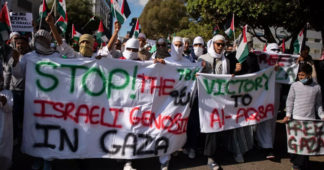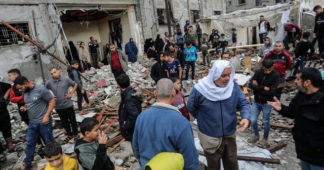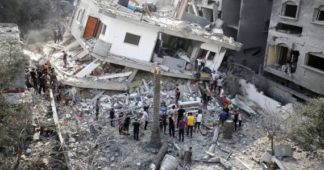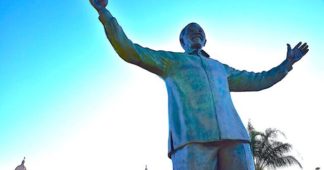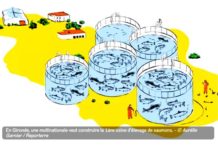By -Anuradha Chenoy*
What everyone with open eyes and a cell phone witnessed 24 x7 for 3 months as Israel massacred Palestinians of Gaza is now being adjudicated in the International Court of Justice (ICJ) in the Hague under the Genocide Convention brought into law by the United Nations in 1948. This case has been brought to this highest Court by South Africa, with a detailed application, where each point is substantiated with recorded and indisputable evidence.[i]
The stakes in this case are high and include:
(i) The right of the Palestinian people to exist as a nation as opposed to the right of a racist colonial state of Israel backed by the great hegemon the United States to exterminate them.
(ii) The legitimacy of the ICJ to fulfill its mandate and therefore the very relevance, fairness, standard of this institution. This is because under the very definitions of the Convention on Genocide of the ICJ, the Palestinian people constitute a national group. Article II of this Convention outlines specific acts that constitute genocide, which include: the intent to destroy in whole or part, a national, ethnical, racial or religious group, by killing members of the group; inflicting conditions for the physical destruction of the group; forcible transfers. All of which have been carried out in full public view by Israel in Gaza.
(iii) The legitimacy of the those supporting and aiding Israel to carry and therefore complicit in this genocide by providing arms, bombs and material aid to destroy the people of Gaza; who call themselves the protectors of a ‘Rule based order’; who claim those outside this ‘order’ as barbarians and ‘uncivilized’; who militarily intervene to protect democracy, human rights, and take a high moral ground on their constant interventions with the narrative of protecting universal (Western) values.
The Cause in this Case is:
(i) The very existence of the Palestinian nation and its recognition.
(ii) Whether a publicly watched ongoing genocide can be stopped by a legitimate international legal entity versus the right of a sovereign state to indulge in collective punishment to massacre its citizens, kill women and children as ‘collateral damage’, target hospitals, medical professionals, journalists, writers, bomb residential buildings, destroy public institutions at will.
(iii) Whether a state and its regime who officially declare intent to destroy a peoples, as when the Israeli Defense Minister dehumanize Palestinians as ‘human animals be treated as such’, order the Israeli Defense Forces-IDF to go for “a full scale response” saying “We will eliminate everything” and then call it ‘moral’ and a ‘right to self-defense’. When Israel’s Prime Minister declares that they will turn parts of densely populated urban Gaza “into ruble” versus the right of the international community and its legal institutions to uphold that every sovereign state has the responsibility to protect its citizens, treat all its citizens as equal under law and constitution. Ensure human rights, especially the right to life and bodily protection.
(iv) Can a state in revenge and following a criminal act (by Hamas) against a privileged section (12,000 or so) of its citizens and armed forces match its intent into orders of incessant, indiscriminate, disproportional bombings; deny this minority basic life necessities like water, adequate food, deny medical assistance, any aid, make conditions unlivable, force the transfer to citizens from homes into transit camps miles away and still declare itself as responsible democratic state with all international privileges versus responsibility of the ICJ to activate its Article 41 of the Statute to order provisional measures to protect rights invoked from imminent and irreparable loss.
The Parties to this Case
The principle petitioner South Africa as the plaintiff is backed by Turkey, Malaysia, Jordan, Bolivia, the 57 member bloc The Organization of Islamic Countries (OIC), then the Maldives, Namibia, Pakistan, and other countries follow. Moreover thousands of advocacy and civil society groups have joined South Africa’s call, including, Physicians against nuclear war, the Asia Europe Peoples Forum, the Transnational Institute, Focus on the Global South, the International Peace Bureau.
The defendants of genocide are obviously Israel and not surprisingly the US whose spokesperson John Kirby calls the South African submission “meritless, counterproductive and completely without basis”. Many Western states have showed their support in different ways but fear the polarization and upsurge in their own societies so remain silent because they generally associate countries outside the West as barbaric and genocidal, like Myanmar against the Rohingyas; the Serbs, the Hutus vs the Tutsis and so on. So their silence here is telling, even as much of the global majority, (many of whom have not spoken out) including Russia and China, hope for a favorable decision from the ICJ.
As far as morals, values, civilizational values are concerned this is a case for freedom versus colonialism, neo-colonialism and imperialism; tolerance versus racism and white supremacy; oppression versus resistance; morality versus duplicity, hierocracy, double standards. The ICJ hold the key to these choices.
South Africa stands morally, politically and historically tall, and the real conscience of the international community lies with civil society and the millions who support the resistance and rightful justice for the Palestinian people.
[i] South Africa’s Application to ICC on Genocide At: https://www.icj-cij.org/sites/default/files/case-related/192/192-20231228-app-01-00-en.pdf
We remind our readers that publication of articles on our site does not mean that we agree with what is written. Our policy is to publish anything which we consider of interest, so as to assist our readers in forming their opinions. Sometimes we even publish articles with which we totally disagree, since we believe it is important for our readers to be informed on as wide a spectrum of views as possible.
